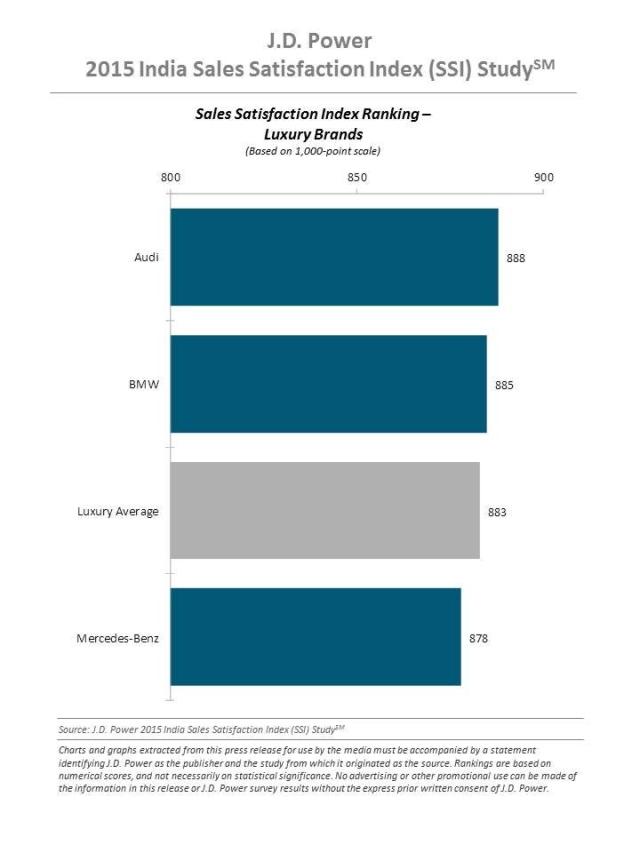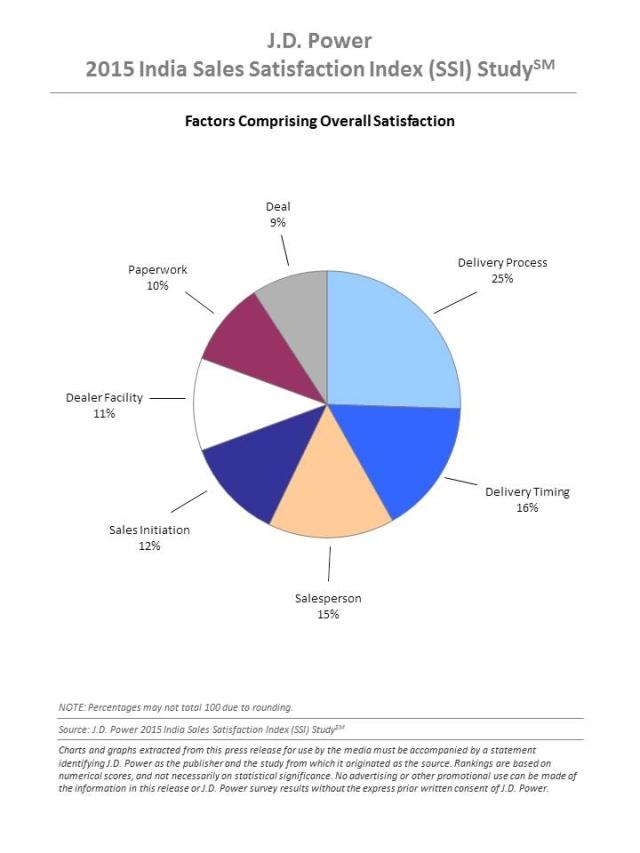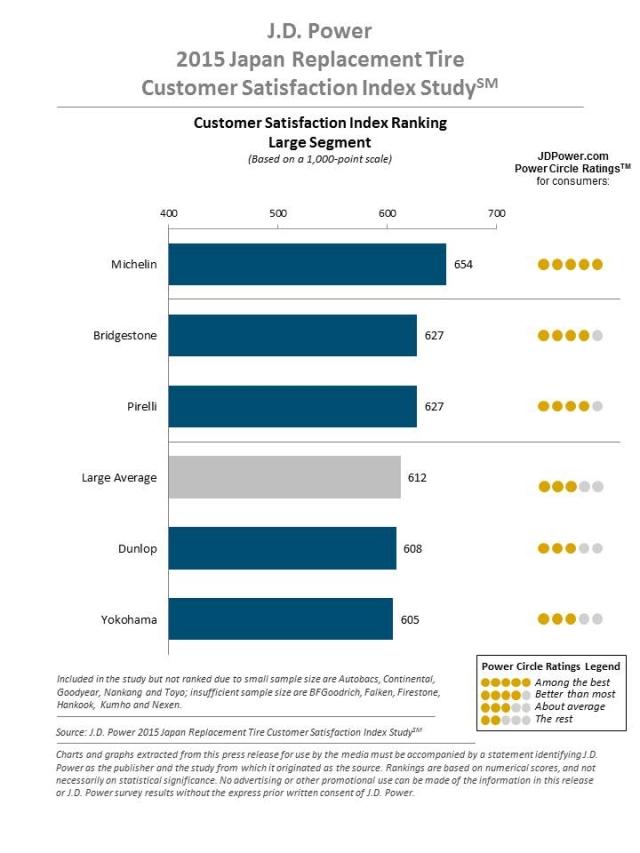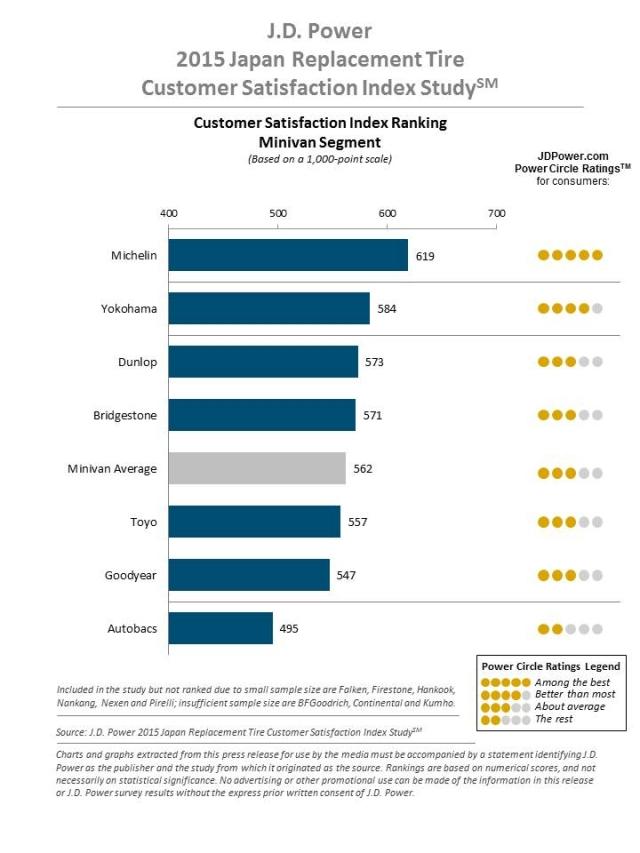Retail Salesperson’s Recommendation for Replacement Tire Brand Leads to Lower Customer Satisfaction in Japan
Michelin Ranks Highest in All Four Vehicle Segments among Replacement Tire Customers
Tokyo: 19 October 2015 ― While a retail salesperson’s recommendation is the main reason customers select a replacement tire brand, satisfaction is significantly lower among customers who purchase the recommended brand than those who select their tires for other reasons, according to the JD Power 2015 Japan Replacement Tire Customer Satisfaction Index StudySM released today.
The study, now in its seventh year, measures vehicle-owner satisfaction with their newly replaced summer tires based on four factors: traction/ handling; ride; wearability; and appearance. Overall satisfaction scores (on a 1,000-point scale) are calculated for four vehicle segments based on owners' evaluations of 10 tire attributes. Overall satisfaction is 567 in 2015, compared with 566 in 2014.
Four in 10 customers who purchase replacement tires from a retail store compare other brands before buying. Among those who purchase from a retail store, 36 percent say the tire brand was “recommended by the salesperson,” the most frequently cited reason for choosing their replacement tires. However, satisfaction among customers who purchase the brand recommended by their salesperson is 542, which is 27 points lower than among those who do not purchase the recommended brand (569).
“Tire retailers need to address the huge disconnect between their replacement tire brand recommendations and low customer satisfaction,” said Taku Kimoto, executive director of the automotive division at JD Power, Tokyo. “The retail salesperson has a unique opportunity to talk with the customer and add value to the shopping experience by providing important insights into tire quality, performance, fuel efficiency and wearability. Online tire websites don’t have the benefit of in-person dialogue.”
Kimoto noted that tire retailers can benefit from building their retail salesforce and developing effective sales training programs. “A knowledgeable salesperson can influence a customer’s tire purchase decision and, in turn, improve satisfaction with the brand,” said Kimoto.
The study finds a correlation between customer satisfaction and brand loyalty. Among highly satisfied customers (overall satisfaction scores of 800 or higher), 94 percent say they “definitely would” or “probably would” purchase the same brand for their next set of replacement tires, and 88 percent say they “definitely would” recommend their brand to others. Repurchase intention drops to 66 percent and recommendation intention drops to 44 percent among customers with low satisfaction (overall satisfaction scores of below 399 and below).
Key Findings
- On a segment basis, overall satisfaction has decreased from 2014 in the midsize segment (581 vs. 590, respectively) and in the large segment (612 vs. 613).
- In the midsize segment, satisfaction has declined the most in the traction/ handling factor (-14 points), followed by the ride and appearance factors (-7 points in each) and wearability (-6). In the large segment, satisfaction has declined the most in the wearability factor (-7 points), followed by traction/ handling (-4) and appearance (-1).
- More than two-thirds (68%) of replacement tire shoppers compare brands online, with the proportion of online buyers increasing to 21 percent in 2015 from 13 percent in 2013. Among online buyers, the most frequently cited reason for purchasing is “the price was cheap,” at 58 percent.
- The reasons cited for tire selection differ slightly by purchase channel. Customers who purchase from a retail store most often indicate price as the most important consideration (24%), followed by cost of ownership (16%), wearability (11%) and fuel efficiency (10%). Online buyers place the most importance on price (29%), cost of ownership (18%), fuel efficiency (7%) and wearability (6%).
2015 Ranking Highlights
The overall satisfaction (OSAT) rankings in the four vehicle segments that are award-eligible are as follows:
Mini-car/ compact car segment (OSAT 540)
Michelin (622) ranks highest in the mini-car/ compact car segment, performing particularly well in all four factors. Dunlop (560) ranks second and Goodyear (557) ranks third.
Midsize segment (OSAT 581)
Michelin (645) ranks highest in the midsize segment and performs particularly well in all four factors. Bridgestone (603) ranks second, followed by Dunlop (585).
Large segment (OSAT 612)
Michelin (654) ranks highest in the large segment and performs particularly well in all four factors. Bridgestone and Pirelli rank second in a tie (627 each).
Minivan segment (OSAT 562)
Michelin (619) ranks highest in the minivan segment and performs particularly well in all four factors. Yokohama (584) ranks second and Dunlop (573) ranks third.
The 2015 Japan Replacement Tire Customer Satisfaction Index Study is based on responses from 7,979 vehicle owners within the first three to 14 months of ownership who purchased new replacement tires (excluding winter tires) between June 2014 and May 2015. The Internet study was fielded from late July through August 2015.
Media Relations Contacts
Shizue Hidaka; JD Power; Tokyo; Japan; +81-3-4550-8060; shizue.hidaka@jdpower.co.jp
John Tews; JD Power; Troy, Michigan, USA; 001-248-680-6218; john.tews@jdpa.com
About JD Power in the Asia Pacific Region
JD Power has offices in Tokyo, Singapore, Beijing, Shanghai and Bangkok that conduct customer satisfaction research and provide consulting services in the automotive, information technology and finance industries in the Asia Pacific region. Together, the five offices bring the language of customer satisfaction to consumers and businesses in Australia, China, India, Indonesia, Japan, Malaysia, Philippines, Taiwan, Thailand and Vietnam. Information regarding JD Power and its products can be accessed through the Internet at asean-oceania.jdpower.com.
About JD Power and Advertising/Promotional Rules www.jdpower.com/about-us/press-release-info
About McGraw Hill Financial www.mhfi.com



